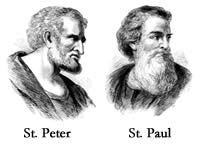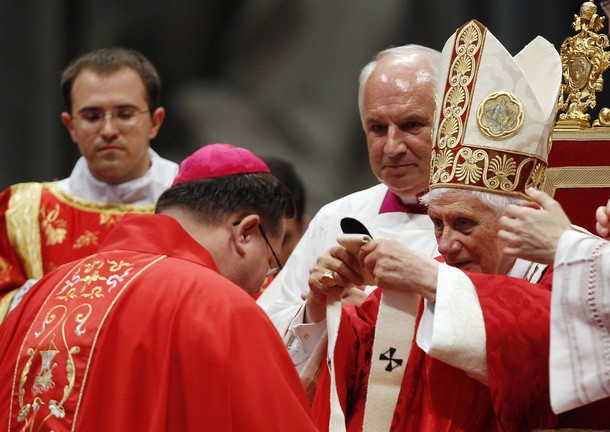 With the Sunday off, the Synod skipped to day eight on Monday, with Cardinal John Tong Hon (at left pictured with the Holy Father) taking up the day’s presiding duties. and 251 Synod fathers in attendance. 26 fathers offered five-minute interventions during the morning session.
With the Sunday off, the Synod skipped to day eight on Monday, with Cardinal John Tong Hon (at left pictured with the Holy Father) taking up the day’s presiding duties. and 251 Synod fathers in attendance. 26 fathers offered five-minute interventions during the morning session.
Lluís Cardinal Martínez Sistach, the archbishop of Barcelona, gave a few points to focus on in the new evangelisation, one of which was “[t]o improve Sunday Mass so that it will be a benchmark for the New Evangelization”. As source and summit of Christian life, the Mass can not be emphasised enough. If we don’t improve our celebration and participation in it to the utmost, any other undertaking, including the new evangelisation, has little chance of succeeding. Cardinal Angelo Scola, archbishop of Milan, also noted this in his intervention.
 Francesco Cardinal Coccopalmerio (pictured at right), president of the Pontifical Council for Legislative Texts, asked the following question: “[I]n carrying out the task of the new evangelization, would it be possible to consider some form of co-operation between the Catholic Church and the other Churches and ecclesial Communities?” adding, “I believe that an affirmative answer must be given to this question.”
Francesco Cardinal Coccopalmerio (pictured at right), president of the Pontifical Council for Legislative Texts, asked the following question: “[I]n carrying out the task of the new evangelization, would it be possible to consider some form of co-operation between the Catholic Church and the other Churches and ecclesial Communities?” adding, “I believe that an affirmative answer must be given to this question.”
The cardinal added that the division between Churches and church communities is “not entirely innocent in terms of the de-christianization of the Old Continent”. He emphasised that ecumenism or at least increased cooperation with the Orthodox Churches of the east is “particularly pressing” as both the Catholic and Orthodox Church now face similar challenges. “It would […] seem very evident that a great ecumenical advantage would derive from such cooperation, and it would greatly consolidate the front of the forces fighting against secularization. It would also present an extraordinary sign to Islam,” he concluded.
Archbishop Stanislaw Gadecki, of Poznan in Poland, outlined a pressing issue regarding the youth in the heavily secularised world we live in.
“Our youth today find themselves in an unsustainable condition. On the one hand, they are thrown long before the appropriate mental age into a world rich in information, knowledge, sensations, and opportunities for encounters, but on the other hand, they are left alone by adults on the path of their formation.”
This is a recognisable fact for anyone working with young people, for example in education. The archbishop draws a possible solution from his own experience (and this is the strength of the Synod; the gathering of experiences from all over the world to benefit the Church):
“This situation requires an adequate response. Adults – in particular those who have drifted away from the Church – must reassume their responsibility.
In our diocese we have sought to help them in this, proposing a catechism for adults carried out by other adults. Inasmuch as the younger generations usually compare their faith with that of adults, baptized parents may again – for the love of their children – become their first and indispensable catechists.
Adult catechists, as witnesses of faith and bearers of the content of faith, are often better than priests at preparing other adults for their educative role.”
 Cardinal John Njue (pictured at left), archbishop of Nairobi in Kenya, pointed at that it is not enough to have faith or even the intention to be faithful.
Cardinal John Njue (pictured at left), archbishop of Nairobi in Kenya, pointed at that it is not enough to have faith or even the intention to be faithful.
“Today, for a good number of people, God is not denied, but is unknown. Is it not necessary to examine, from this unique perspective, the present crisis in which society finds itself? It is time to throw open wide the doors of our Churches and to return to announcing the resurrection of Christ, whose witnesses we are. As the holy bishop Ignatius wrote, “It is not enough to be called Christians; we must be Christians by our witness.” If someone today wants to recognize Christians, he must be able to do so not on the basis of their intentions, but on the basis of their commitment in the faith. We have the duty to shape the whole of society with Christ’s teachings and spirit.”
Archbishop William Slattery, of Pretoria in South Africa, asked about the proper formation of seminarians, but also devoted a few words to how the Church makes use of the media, stating, “I like the policy of the English Church prior to the papal visit when they carefully selected and trained bright young people to defend and explain their faith. An attractive young lady doctor is much more effective in media propounding on medical issues than an elderly unmarried bishop.”
In the afternoon session there were 16 more interventions, among them those by Archbishop Robert Zollitsch of Freiburg im Breisgau and Bishop Franz-Josef Bode of Osnabrück.
About the new media, Bishop Emmanuel Badejo, of Oyo in Nigeria, said the following:
“I would like this Synod to strongly reaffirm the role and responsibility of Catholic media professionals and practitioners in the New Evangelization and the need to pay particular attention to their spiritual development. Millions of youth all over the world are sharing the same stories, experiences and challenges, irrespective of their location, thanks to the new social, personal and digital media. The Church must humbly seek their confidence and trust knowing that youth prefer a co-communicator relationship to the old teacher-learner, speaker-listener model. When they feel like allies with the Church they can with the right format and language bring their Christian faith and values to the new social forums.”
At the end of the afternoon session, the Synod fathers were shown a film about the faith in Europe. Titled ‘Bells of Europe’, it features interviews with several important players in the field of faith, including Pope Benedict XVI. His contribution may be read here.
Photo credit: [1] L’Osservatore Romano, [2] nava m K0
 Which is also, of course, the Solemnity of Saints Peter and Paul, the rock and the apostle to the gentiles, in many ways the foundations of the Church. And also, it is the day upon which Pope Benedict XVI celebrates 60 years of priesthood.
Which is also, of course, the Solemnity of Saints Peter and Paul, the rock and the apostle to the gentiles, in many ways the foundations of the Church. And also, it is the day upon which Pope Benedict XVI celebrates 60 years of priesthood.